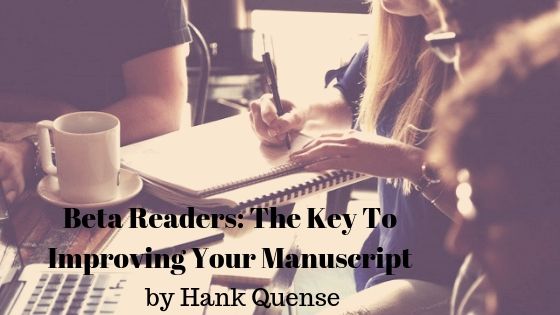by Hank Quense, @hanque99
The best way to improve your manuscript is to show it to other writers. This article discusses the role of beta readers and it ends with a list of questions beta readers should answer.
One milestone in writing a book is reaching a point where you can hire a content editor to examine it. However, content editors are expensive, perhaps prohibitively so.
An alternative to hiring a content editor is to recruit other writers and ask them to critique your work. Critiquers are also called beta readers by some folks including me.
One mistake inexperienced writers often make is to ask family members to comment on the story. Besides the potential for embarrassing the family members, these readers can offer no advice on how to improve the book unless they are also writers.
While some readers may have a good sense on what works for them, they don’t have the background to tell an author ‘why’ it didn’t work. The reader may not like a character or may get turned off by the plot, but statements like that are too vague to be of much use to the author. The author needs to hear why the character is not likable (too many bad habits perhaps). As for the plot, there are many factors that can make it go awry. These include: illogical developments, twists that aren’t properly developed and explained, irrational actions by the characters and many more. If the author gets feedback from other writers on these factors, the author can take steps to fix the problems.
Beta readers will often agree to work on your story in return for you taking a look at their book. Thus, it’s a quid pro quid arrangement. An objective with beta readers is to have at least three of them work on your book. Six would be a better number and a dozen is ideal. This will give you a range of comments and opinions to look at.
The comments from the beta readers will identify problems that must be addressed. If they do their job correctly, they will likely tear your book apart and that can be a painful process for the inexperienced author who probably thinks the work is already damn-near perfect.
Beta reader comments also present the author with a decision that has to be made: are the comments valid or not? It is not unusual to come across an occasional comment that will not improve the book and can be safely ignored. Other comments may actually dis-improve it if implemented..
It is the author’s responsibility to weigh the comments with an open mind and choose the ones that will make the manuscript stronger and better. Oftentimes, this selection process will result in major revisions that must be incorporated into the book before the publishing process can move forward. You certainly don’t want to send the unrevised manuscript to an editor and you certainly don’t want to spend time formatting a version that will have dramatic changes in it later on
This is why it is necessary to recruit and use beta readers as early as possible.
Ask the beta readers to return their comments within a month, a reasonable request unless they are in the middle of their own writing or publishing project.
I send my beta readers a list of questions I’d like them to answer after they finish reading the manuscript. The questionnaire is listed here:
Please answer as many questions as you feel are relevant. There is no need to answer ALL of the questions (unless you want to)
1: Did the story hold your interest from the very beginning? If not, why not?
2: Did you get oriented fairly quickly at the beginning as to whose story it is, and where and when it’s taking place? If not, why not?
3: Could you relate to the main character? Did you feel her/his pain or excitement?
4: Did the setting interest you and did the descriptions seem vivid and real to you?
5: Was there a point at which you felt the story lagged or you became less than excited about finding out what was going to happen next? Where, exactly?
6: Were there any parts that confused you? Or even frustrated or annoyed you? Which parts, and why?
7: Did you notice any discrepancies or inconsistencies in time sequences, places, character details, or other details?
8: Were the characters believable? Are there any characters you think could be made more interesting or more likable?
9: Did you get confused about who’s who in the characters? Were there too many characters to keep track of? Too few? Are any of the names of characters too similar?
10: Did the dialogue keep your interest and sound natural to you? If not, whose dialogue did you think sounded artificial or not like that person would speak?
11: Did you feel there was too much description or exposition? Not enough? Maybe too much dialogue in parts?
12: Was there enough conflict, tension, and intrigue to keep your interest?
13: Was the ending satisfying? Believable?
14: Did you notice any obvious, repeating grammatical, spelling, punctuation or capitalization errors? Examples?
15: Do you think the writing style suits the genre? If not, why not?
16: Did I introduce too many characters in the first scene?
This list is based on https://writingcooperative.com/15-questions-to-send-beta-first-readers-please-steal-3ff9fa198b5
~ ~ ~
This article was taken from my new book, How to Self-publish and Market a Book.
Are you considering self-publishing your first book? Naturally, you have questions and concerns. This book has your answers. It integrates both the publishing and the marketing to provide you with a complete project plan to market your book while you publish it.
It will be available on September 15, 2019. Until then, the pre-order is on sale at $2.99, a 40% reduction.
The book is available at:
Amazon: https://amzn.to/2Zbrx54
Barnes & Noble: https://bit.ly/2Y2rewE
Smashwords: https://www.smashwords.com/books/view/949789
Kobo: https://bit.ly/2ltLzbU
And other online book sellers

Hank Quense writes humorous and satirical sci-fi and fantasy stories.
He also writes and lectures about fiction writing and self-publishing. He has published 19 books and 50 short stories along with dozens of articles. He often lectures on fiction writing and publishing and has a series of guides covering the basics on each subject. He is currently working on a third Moxie novel that takes place in the Camelot era.
He and his wife, Pat, usually vacation in another galaxy or parallel universe. They also time travel occasionally when Hank is searching for new story ideas.
You can connect with Hank on his Amazon Author Page.
Author @Hanque99 Explains the Importance of Beta Readers: Share on X
Photo on Visualhunt.com


I like the idea of a questionnaire.
I use test readers (those who read my genre) the first round and those questions would be excellent for them. (Then I use critique partners for the next round.)
That’s a very detailed list of questions. It will certainly help find any issues with the manuscript.
I’ll admit that I’ve not done a questionnaire before, but I agree completely about the importance of beta readers. In fact, the time couldn’t be better for this post; I just sent my most recent manuscript out to my own beta readers…
I’ve noticed my beta readers like the questionnaire. It focuses their attention on what to look for and what to tell me about.
Thanks so much for the post, Hank! I’ve found my beta readers offer so many valuable tips for improving a book before it hits the retailers. I use mine for every book!
I use them on every book also. Sometimes what they point out to me is shocking! Thanks for posting my article. It looks great.
Those are great questions. And I like the idea of giving beta readers a set period of time to get back to you. Thanks for the tips.
Hi Natalie: I’ve found if you don’t give the beta readers an end date, they will take forever to get their comments back to you. In some cases, I had to give up waiting for them .
I don’t have beta readers yet – soon I hope!
I like this list – very focused and clear! Thanks :)
I hope you find it useful, Jemi
I have my own list, but I like this one better! Thank you, Hank and Elizabeth for hosting you.
Teresa C.